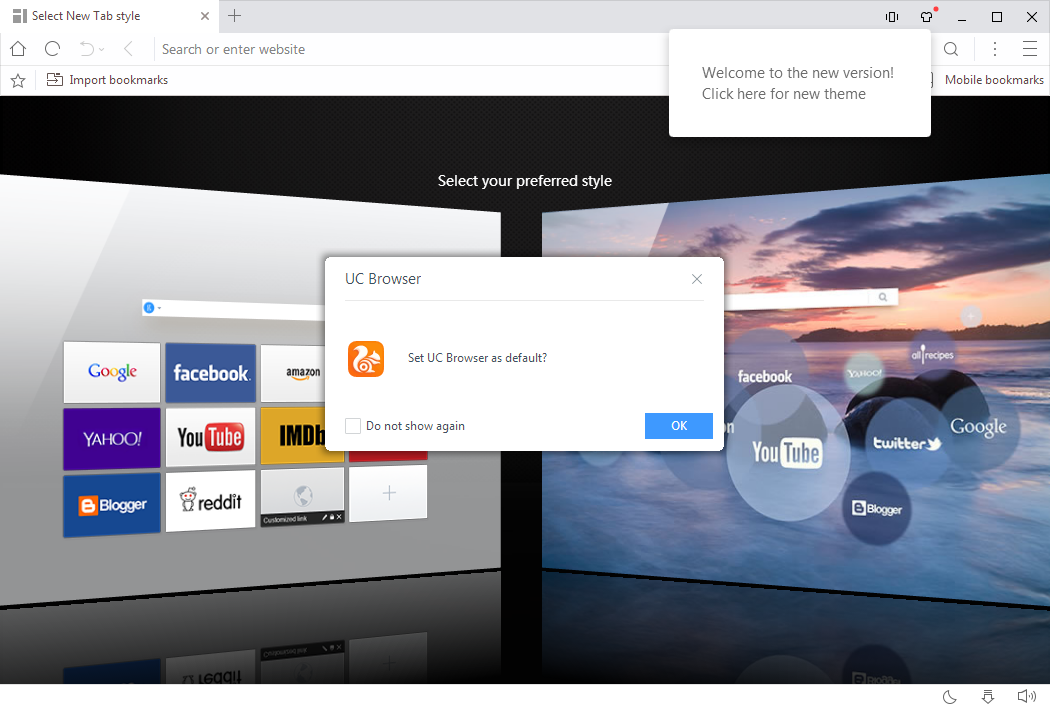UC Browser
UC Browser: An In-Depth Overview
UC Browser is a web browser developed by the Chinese mobile internet company UCWeb, a subsidiary of the Alibaba Group. Known for its speed, data compression capabilities, and compatibility with various platforms, UC Browser has become a popular choice among millions of users worldwide, especially in regions with limited internet bandwidth. Below is a comprehensive overview of UC Browser, its features, advantages, controversies, and impact.
History and Development
UC Browser was initially launched in 2004 as a Java application. Over the years, it evolved to support multiple platforms, including Android, iOS, Windows, Symbian, and Blackberry. Its growth was fueled by its ability to address the unique challenges faced by users in emerging markets, such as slow internet speeds and limited data availability.
In 2014, UCWeb was acquired by Alibaba Group, which further accelerated its development and global expansion. By focusing on markets like India, Indonesia, and other parts of Asia and Africa, UC Browser became one of the most downloaded browsers in these regions.
Key Features
- Data Compression and Speed
UC Browser is renowned for its data compression technology, which reduces the size of web pages and content. This not only speeds up loading times but also helps users save on data costs, making it ideal for regions with expensive or slow internet services. - Multi-Platform Support
The browser supports a wide range of operating systems, ensuring that users can access it regardless of their device. This cross-platform compatibility has contributed significantly to its widespread adoption. - Cloud Syncing
UC Browser allows users to sync their bookmarks, history, and settings across devices using their UC account. This feature enhances the browsing experience by maintaining consistency across multiple devices. - Night Mode
Recognizing the need for eye comfort during nighttime browsing, UC Browser offers a Night Mode, which reduces screen brightness and adjusts colors to minimize eye strain. - Built-in Ad Blocker
The browser includes a built-in ad-blocking feature that enhances browsing by reducing intrusive ads. This feature also improves page loading speeds and data savings. - Smart Downloads
UC Browser features a robust download manager with resumable downloads, multi-threading for faster downloads, and support for background downloading. It also categorizes downloaded files for easy access. - Customizable Interface
The browser offers a range of themes and backgrounds, allowing users to personalize their browsing experience. - Video Streaming Optimization
UC Browser optimizes video content for smoother playback, even on slower networks. It also supports gesture controls for video playback. - Offline Browsing
Users can save web pages for offline access, which is particularly useful in areas with unreliable internet connections.
Advantages of UC Browser
- Efficiency in Low-Bandwidth Environments
The browser’s data compression and speed optimization features make it a top choice in areas with slow or expensive internet services. - User-Friendly Interface
Its simple and intuitive design caters to a broad audience, including those who may not be tech-savvy. - Free and Feature-Rich
Despite being free, UC Browser offers a range of features, such as ad-blocking, smart downloads, and night mode, which are often premium options in other browsers. - Localized Content
The browser often integrates region-specific content, catering to the preferences of local users. For example, in India, UC Browser includes cricket updates, entertainment news, and regional language support.
Features and Highlights

Controversies and Criticisms
Despite its popularity, UC Browser has faced several controversies that have affected its reputation:
- Data Privacy Concerns
Multiple reports have raised concerns about UC Browser’s handling of user data. Studies have alleged that the browser collects sensitive user information without adequate security measures and transmits it to remote servers, potentially compromising user privacy. - Ban in Certain Countries
In 2020, UC Browser was banned in India, along with several other Chinese apps, due to national security concerns. This significantly impacted its user base, as India was one of its largest markets. - Misleading Advertisements
UC Browser has been accused of using aggressive and misleading advertising tactics to promote its services, leading to criticism from regulatory authorities. - Incompatibility with Modern Web Standards
While UC Browser excels in speed and efficiency, it has been criticized for lagging behind competitors like Google Chrome and Mozilla Firefox in terms of supporting modern web standards and security protocols.
Comparison with Competitors
UC Browser faces stiff competition from other popular browsers like Google Chrome, Mozilla Firefox, and Microsoft Edge. Below is a comparison:
| Feature | UC Browser | Google Chrome | Mozilla Firefox | Microsoft Edge |
|---|---|---|---|---|
| Data Compression | Yes | No | No | No |
| Ad Blocker | Built-in | Extensions needed | Built-in | Extensions needed |
| Privacy Features | Limited | Strong | Very Strong | Strong |
| Speed | Optimized for low bandwidth | High on modern networks | Moderate | High on modern networks |
| Platform Support | Extensive | Extensive | Extensive | Moderate |
Impact and Legacy
UC Browser has had a profound impact on mobile internet usage in emerging markets. Its ability to provide fast and data-efficient browsing helped millions of users access the internet for the first time. The browser played a significant role in democratizing access to online content, particularly in regions with infrastructure challenges.
However, its legacy is also marked by concerns over privacy and security, which have tarnished its reputation in recent years. As the internet landscape evolves, UC Browser faces the challenge of addressing these issues while maintaining its competitive edge.
Conclusion
UC Browser is a testament to the power of innovation in addressing real-world challenges. Its focus on speed, efficiency, and accessibility has made it a favorite among users in bandwidth-constrained regions. However, to remain relevant and regain trust, the browser must address its privacy and security shortcomings and adapt to modern web standards. Despite its controversies, UC Browser’s influence on the global internet ecosystem is undeniable, highlighting the importance of catering to diverse user needs in a rapidly changing digital world.
